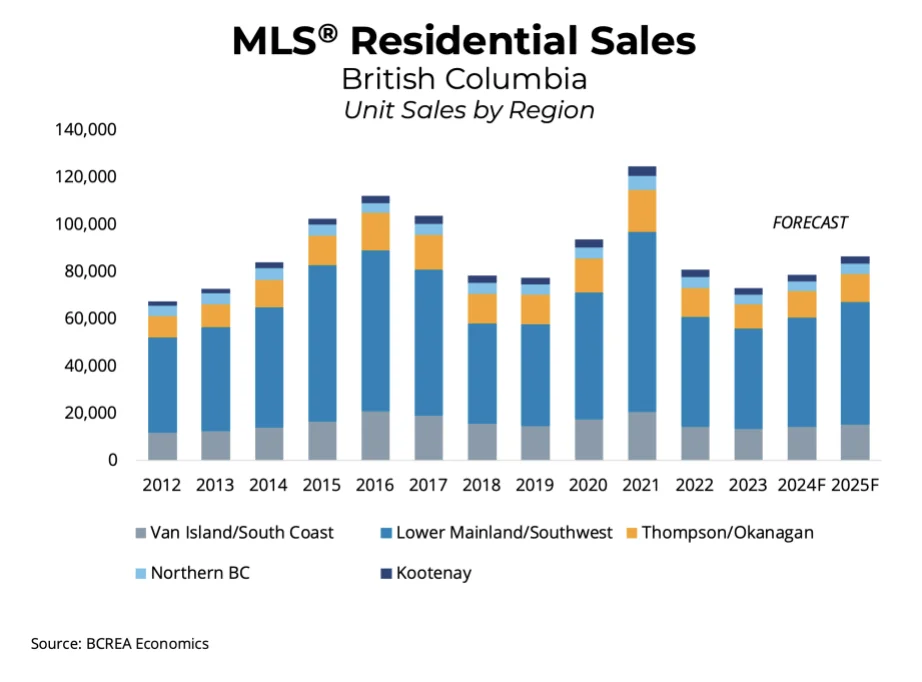Canada Housing Market 2024: Trends and Predictions
Canada Housing Market: 5 YEAR Trends and Predictions

Canadian Real Estate Market Outlook: What to Expect in the Next Five Years
Predicting the future of the real estate market is a bit like trying to guess the outcome of a thrilling hockey game—it’s full of surprises! If we had the power to see ahead, we might all have cashed in on Sidney Crosby’s golden goal in 2014. However, while we can’t foresee everything, history does offer valuable lessons that can help us anticipate trends, especially as interest rates continue to shift.
The past few years have been anything but ordinary. The COVID-19 pandemic shook up the real estate market, leaving many Canadians feeling restless during lockdowns. This led to a surge in home renovations and a significant number of people deciding to move.
This shift caused a spike in prices throughout 2021, with buyers scrambling for the limited inventory available. However, the market is evolving again. Recent data from the Canadian Real Estate Association (CREA) indicates that market activity has picked up this spring after a dip last year. Although prices remain below their peak, they are beginning to rise once more.

Navigating Interest Rate Uncertainty
At the start of 2022, the Bank of Canada’s overnight interest rate was at a near-record low to encourage post-pandemic borrowing. Since then, rates have climbed from 0.25% to an impressive 4.75%, the highest in two decades. While the pace of rate hikes has slowed, the future remains uncertain, with some economists predicting at least one more increase before the end of 2023.
Christopher Alexander, President of RE/MAX Canada, notes that the Bank of Canada plays a crucial role in long-term forecasting. Interestingly, the rate hikes have not deterred buyers as much as expected. While they may adjust their borrowing limits, many are still eager to enter the market rather than wait for rates to drop.
CREA economist Ryan Biln emphasizes that interest rates will continue to impact the market. Higher rates make it more challenging for potential homebuyers and developers alike, leading to higher costs for new builds and making it tougher for existing homeowners facing mortgage renewals.

The Inventory Challenge
While interest rates are a hot topic, Alexander believes that the real issue is the lack of available inventory—a problem CREA is keenly addressing. Despite the influence of interest rates, a significant trend is the sheer shortage of homes, particularly in major cities like Toronto and Vancouver.
Biln highlights that this scarcity, combined with population growth, is creating tight market conditions and a nationwide affordability crisis. He points out that uncoordinated policies and limited new supply contribute to the high prices seen across the country.
Alexander adds that bureaucratic red tape further complicates the situation, slowing down the approval process for new developments. This delay impacts pricing in urban centers, where demand far exceeds supply.

Opportunities Beyond Major Markets
Despite the challenges in cities like Toronto and Vancouver, there’s positive news from other parts of the country. Provinces such as Alberta, Saskatchewan, and Newfoundland and Labrador are attracting new residents with their more affordable housing prices and efforts to diversify their economies.
Smaller cities are actively welcoming home buyers. For instance, while the benchmark home price in the Greater Toronto Area is $1.17 million, in Regina it’s closer to $300,000. This makes these areas appealing, especially for millennials seeking homeownership.
Biln suggests that we might see more intergenerational or roommate living arrangements in the next five years as people navigate the high costs of owning a home. However, the overall lack of inventory makes it challenging to predict the exact future of the Canadian housing market.
“It took nearly a decade for inventory levels to drop to their current lows nationwide,” he explains. “We saw a significant reduction in inventory following the 2014 oil price shock, which led to lower interest rates to boost the economy. This trend caused many Canadians to move from energy-dependent regions to places like British Columbia and Ontario, driving up prices there.”
Making Informed Decisions
While it’s impossible to make firm predictions on where the market is headed over the next five years, we can look at data that may help identify general trends and opportunities to current and prospective home buyers. If you’re wondering what the market is like in your area, speak with a local REALTOR®. They can give you information not only on homes, but also on the overall housing market, to help you make the most informed decision possible.
The article above is for information purposes and is not financial or legal advice or a substitute for financial or legal counsel.
Categories
Recent Posts









